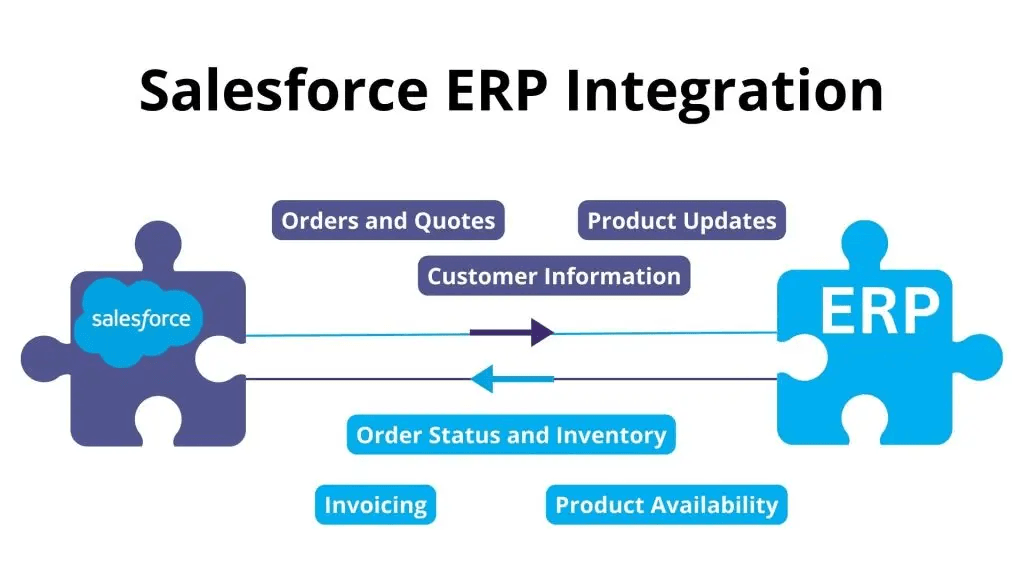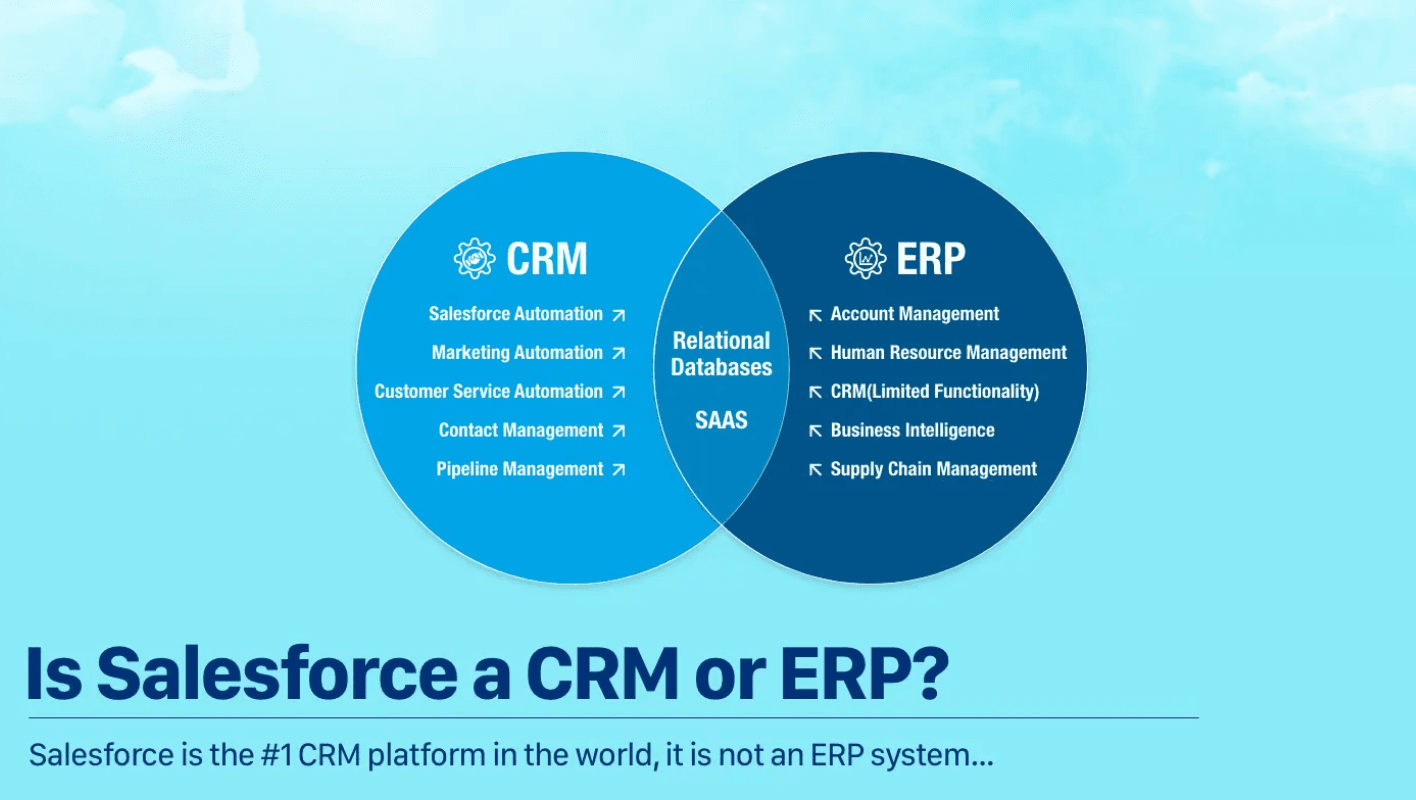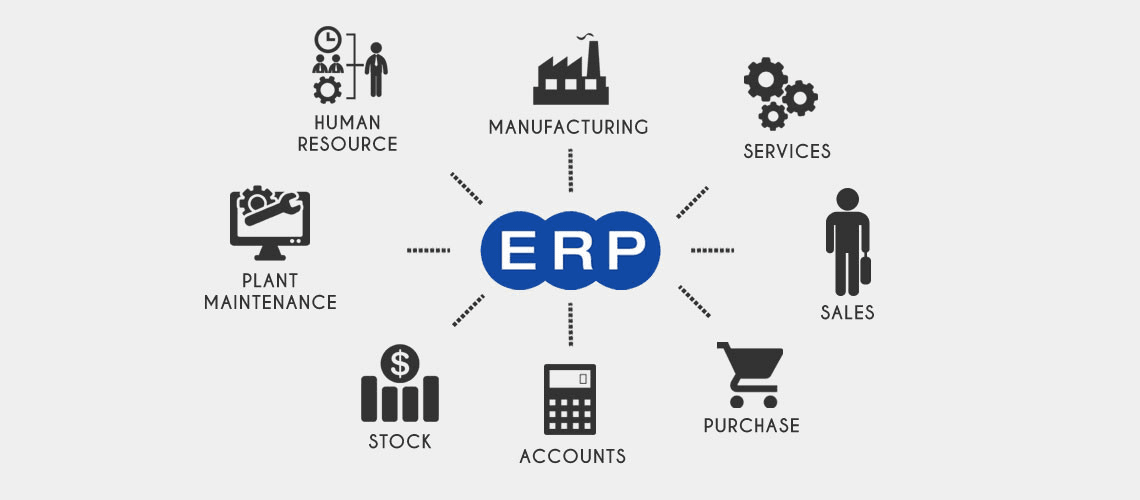Heard of Salesforce CRM? Of course, you have! That’s the core of Salesforce’s existence providing high-quality customer relationship management services to global clients. However, did you ever come across the term “ERP” or “Enterprise Resource Planning”?
No?
Well, that’s also in Salesforce’s house!
What is Salesforce ERP?
Enterprise Resource Planning is designed to function like a CRM IT platform. It hosts a variety of technologies in the ecosystem. Want to know more?
Let’s explore what is Salesforce ERP and its benefits in detail in this blog!
Is Salesforce An ERP?

An ERP system is not Salesforce. Although Salesforce does not provide an ERP as a stand-alone solution, it may be linked with your ERP in a number of ways to improve and support it, especially for startup businesses.
Salesforce is well-known for its extensive CRM features and is mostly used for managing sales, marketing, and customer interactions. However, ERP systems work as the backbone of a Salesforce development company, managing a variety of tasks like supply chain management, inventory control, finance, and human resources.
Firms may build an ecosystem where data flows across departments easily by combining these two systems into one. This will enable firms to approach operations fully and manage a more successful overall company plan.
Benefits of Integration ERP & Salesforce CRM

1) Simplifying Operations Procedures
Simplifying company operations is one of the main advantages of combining Salesforce with ERP. A more responsive and efficient work environment is produced by this synergy, enabling teams to work together easily and make choices based on precise and current data.
Minimal Data Loss Risk: Dismantling departmental silos and guaranteeing smooth information transfer throughout the whole enterprise.
Synchronised Workflow: Establishing a cohesive setting in which disparate teams may work together without difficulty, resulting in a more streamlined and effective business process.
Smooth Communication: Improving department-to-department communication, encouraging teamwork and information sharing.
Enabling teams to make well-informed decisions by giving them access to precise and up-to-date data may enhance organisational decision-making processes.
2) Enhanced Data Accuracy
For any firm to be successful, data integrity is essential. By guaranteeing a single source of truth for data, the connection of Salesforce and ERP systems lowers the possibility of mistakes brought about by inconsistent systems and human data entry.
Minimisation of Errors: Reducing the possibility of errors by doing away with the necessity of manual transfers or redundant data entering.
Reduction of Manual Data Entry: To reduce human mistake and guarantee data correctness, automate data transmission procedures.
Uniformity Throughout the Organisation: Creating a dependable and uniform data base for every department.
Ensuring accurate reporting by ensuring that data reflected in reports produced by integrated systems is as current and accurate as possible.
DianApps is the leading provider of Salesforce CRM services. Read why we are the top salesforce development company for businesses.
3) Improved Customer Experience
Businesses may obtain a 360-degree perspective of their consumers through the integration of Salesforce with ERP systems. Businesses may provide a more individualised and responsive customer experience by merging purchase history, invoices, and service records from the ERP system with customer data from Salesforce.
Integration of Customer Data: Bringing together data about customers from several sources to present a comprehensive picture for improved comprehension and interaction.
Personalised Experiences: Tailored offers, messages, and services to specific consumer preferences through the use of integrated data.
Faster Response Times: Being able to obtain pertinent data in real-time and immediately respond to client enquiries.
Enhanced Customer Satisfaction: Resolving customer enquiries quickly and effectively meets consumer expectations while improving the entire experience.
4) Efficient Order and Inventory Management
Order and inventory management for companies in the manufacturing, distribution, or retail sectors greatly enhances by the integration of Salesforce with ERP.
Precise Order Promises: Giving clients dependable delivery schedules predicated on current stock levels.
Optimal Inventory Levels: Making sure that there are neither surpluses nor shortages of inventory in order to fulfil demand.
Error reduction: Reducing the number of mistakes made when processing orders by hand, which results in a more dependable and effective order fulfilment procedure.
Supply chain optimisation is the process of making the supply chain more efficient by automating procedures and adapting quickly to demand fluctuations.
5) Seamless Financial Management
ERP and Salesforce integration improves financial management and visibility. Companies may easily synchronise sales data with financial systems to expedite procedures and provide finance teams the information they need to make data-driven strategic choices in real time.
Ensuring that financial reports are based on the most recent and accurate sales data is essential to proper financial reporting.
Giving financial teams access to real-time information on the state of the company’s finances is known as “real-time financial visibility.”
Better Revenue Recognition: By combining sales and financial data, revenue recognition accuracy is increased.
Improved Financial Analysis: Enabling more comprehensive financial analysis and strategic planning through the use of integrated sales and financial data.
6) Data-Driven Analytics
By combining customer data from Salesforce with operational data from ERP systems, organizations can gain deeper insights into their business performance.
Combined Customer and Operational Data: Merging customer-centric data from Salesforce with operational information from ERP systems creates a comprehensive dataset that provides a complete view of business operations.
Identification of Trends and Patterns: Analyzing integrated data allows organizations to identify trends, patterns, and connections that might go unnoticed.
Informed Decision-Making: Leveraging advanced analytics tools on the integrated dataset empowers organizations to make informed, data-driven decisions.
Long-term Strategic Planning: The ability to forecast future demand and identify strategic opportunities enables businesses to plan for the long term, and manage growth and success.
Also read: How salesforce consulting can improve your business processes.
7) Increased Productivity and Efficiency
By integrating Salesforce with ERP systems, a platform is built that makes an organisation more adaptable and responsive to changes in the market by doing away with the need for redundant data input and manual data transfers.
Employee Focus on Strategic duties: Employee productivity may be enhanced by refocusing their energies on more strategic and value-added duties by eliminating the requirement for manual data management.
Increased Productivity: Processes are streamlined and less time and effort are needed for daily operations when regular tasks like data input and transfers are automated.
Enhanced Agility: A more responsive organisation can react to opportunities and changes in the market more quickly when departments are more productive.
8) Scalability and Future-Readiness
An organization’s capacity to scale operations becomes essential as it grows. Salesforce’s connection with ERP systems offers a scalable base that can change to meet the organization’s evolving demands.
Ability to Scale Operations: Businesses may easily scale operations to meet growing needs and evolving business requirements thanks to the integrated platform.
Integration of New Technologies: To remain competitive in a business environment that is changing quickly, organisations that are future-ready can effortlessly integrate new technologies into their integrated system.
Also read: Top 10 promising trends for Salesforce
Extension of offers: By handling a variety of income sources, integrated systems enable the extension of product or service offers without the limitations of fragmented systems.
Why ERP Software Is Important for Growth

There’s just no getting around the need to invest in an ERP system if you want to expand. The quantity of clients and data you oversee reduces inside the same disjoint systems. There is just so much that Excel sheets can do.
When your systems aren’t communicating with one another, it can be quite challenging to implement a crucial pivot in a business model in addition to expanding your core business. If sales, marketing, accounting, and operations are all operating in different silos, can you picture attempting to convince them to transition from one-time product-sale income to continuing solutions-recurring revenue?
Nothing significant could ever go unnoticed.
Efficiency is ultimately the main advantage of an ERP implementation. In today’s business environment, internal resource waste can have an equal influence on a company’s earnings as external sales. Even if you may be making a tonne of money, your route to profit may take far longer if you’re losing time and energy on your business’s operations.
Also read: Maximizing Sales Productivity with Salesforce Automation
Manual touchpoints and redundant procedures are eliminated by ERP software. All business lines’ data are synchronised, which speeds up the retrieval of correct information. When information is uniformly centralised throughout departments, there is an improvement in collaboration and communication.
Additionally, scaling makes infinitely simpler because all firm data consolidates into a single system. To meet your company demands, you may combine other systems, like your CRM platform, and add more users and features in order to reach the illusive “single pane of glass.”
ERP offers significant cost benefits, even when the hefty implementation costs are a few factors to consider. Reduced staff work hours, more precise data input, cheaper administrative expenses, and streamlined procedures are some ways that businesses save resources. While these advantages are all quite clear, there are three additional places where ERP makes money in slightly more subtle ways.
Integrate Salesforce & ERP System With Us!
Integration of Salesforce ERP is a calculated risk that might revolutionise the way your company operates.
But there are obstacles along the way, including issues with data consistency, financial constraints, and technological difficulties. Choosing the appropriate Salesforce Implementation Partner is essential to effectively navigating these obstacles.
Prepare yourself to use Salesforce-ERP integration to grow your company to new heights? Speak with DianApps, a dedicated Salesforce Consulting Partner with a solid track record.
Get in touch with us right now!
Also read: Why hire Salesforce developers from DianApps in the UK.










Leave a Comment
Your email address will not be published. Required fields are marked *